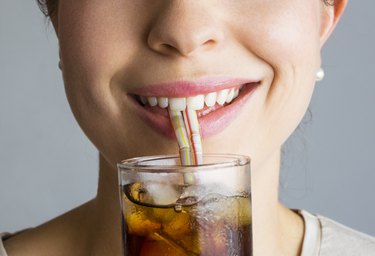
Sugary drinks, including sodas, loom large in the American diet. Beyond the ill effects of consuming sugar-sweetened beverages daily lies another risk: the potential to experience heart-racing discomfort from caffeine consumption.
Read more: The Top 10 Worst Soft Drinks For Your Health
Video of the Day
Video of the Day
Caffeine and Your Heart Rate
The caffeine in dark-colored and light-colored sodas "can elevate heart rate just as it can when consuming coffee," explains Connie Diekman, RD, MEd, a food and nutrition consultant, former president of the American Dietetic Association and former director of university nutrition at Washington University in St. Louis.
While the U.S. National Library of Medicine (NLM) does point out that a typical cup of coffee packs a bigger caffeinated punch, sodas are no slouches in the stimulant department. For example, NLM notes that a typical 12-ounce can of cola contains 35 to 45 milligrams of caffeine. The Mayo Clinic pegs that figure at 22 milligrams in an 8-ounce can. (That compares with 95 to 200 milligrams in standard cups of coffee, says the NLM.)
Beyond serving as both a diuretic and a nervous system stimulant, the NLM notes, caffeine is also known for increasing blood pressure.
Know Your Limitations
For most people, according to both the NLM and Mayo, it's safe to consume up to 400 milligrams of caffeine a day. But Mayo Clinic also stresses that exactly how caffeine actually affects an individual's heart rate can vary widely from person to person.
Diekman agrees. "For some people, the heart-racing effect can be felt with one soda," she cautions. "For others, it might require larger quantities. It all depends on how caffeine affects your body."
That thought is seconded by Lona Sandon, PhD, RDN, an associate professor in the clinical nutrition department at the University of Texas Southwestern Medical Center in Dallas. When it comes to palpitations or the heart beating fast after drinking soda, "caffeine in excessive amounts could be a culprit," she says, "especially for those who are more sensitive to caffeine's effects."
Caffeine and Blood Pressure
In fact, Mayo Clinic points out that caffeine intake can lead to a short but dramatic spike in blood pressure, even for those who do not have a history of chronic high blood pressure. Exactly why is unclear. But Mayo notes that some research suggests that caffeine may interfere with a hormone that normally helps to ensure that arterial pathways remain wide open.
Additional research indicates that the caffeine found in sodas leads to an increased release of the hormone adrenalin, which, in turn, drives up blood pressure. Either way, as Mayo Clinic reports, some regular soda drinkers' average blood pressure is higher than non-soda drinkers, but other regular soda sippers seem to form a tolerance to caffeine and don't experience long-term blood pressure effects.
The bottom line: Whether your heart starts racing after just a single can of soda or three, the smoking gun may very well be all that newly ingested caffeine.
- Lona Sandon, PhD, RDN, associate professor, department of clinical nutrition, University of Texas Southwestern Medical Center, Dallas
- Connie Diekman, RD, MEd, food and nutrition consultant; former president, American Dietetic Association; former director of university nutrition, Washington University, St. Louis
- U.S. National Library of Medicine: “Caffeine”
- Mayo Clinic: “Caffeine Content for Coffee, Tea, Soda and More”
- Mayo Clinic: “Caffeine: How Does It Affect Blood Pressure?”